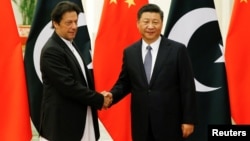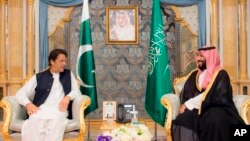Pakistan has requested financial help from its close allies, including China and Saudi Arabia, and a bailout package from the International Monetary Fund (IMF) to help revive its economy and deal with debt and balance-of-payments problems.
Earlier this week, Pakistan Prime Minister Imran Khan secured financial pledges from China during a four-day official visit to China, where he met with leaders, including President Xi Jinping.
Chinese and Pakistan officials have not given details, but they say China plans to provide an unspecified financial “grant” to Pakistan.
Among other financial dealings, Khan also secured more than $6 billion in financial support from Saudi Arabia during a September visit there. And the United Arab Emirates is reportedly considering Islamabad’s request for up to $6 billion.
What strings are attached?
Many experts, however, say taking financial assistance from the Saudis and UAE might require a diplomatic or strategic payback.
“It’s unlikely a $6 billion gift would come with no strings attached,” Michael Kugelman, deputy director of the Asia Program at the U.S.-based Wilson Center, told VOA.
“I imagine in all likelihood Islamabad had to reassert its allegiance to KSA [the Kingdom of Saudi Arabia], with the implication that Pakistan should back away from the Imran Khan government’s strong assertion of neutrality in the Iran-Saudi Arabia rivalry,” Kugelman added.
Husain Haqqani, Pakistan’s former ambassador to the U.S. and director for South and Central Asia at the Washington-based Hudson Institute, echoed Kugelman’s assessment.
In a recent op-ed for The Print, Haqqani said that Riyadh wants Pakistan to support the kingdom against Iran’s actions in the region.
Stand with the Kingdom
“Saudi Arabia is also unwilling to continue giving cash first and making requests later, something it has done as a friend of Pakistan in the past. Its current leader, Crown Prince Mohammed bin Salman Al-Saud, wants Pakistan to shed ambiguity and stand by the Kingdom against Iran, in addition to providing troops or other material support for the Saudi war effort in Yemen,” Haqqani wrote.
“The Saudis say they are willing to invest in Pakistan but, like the Chinese, would want security and a good return for their investments,” Haqqani added.
“Saudi Arabia has money and Pakistan has military power with great strategic location. Saudi Arabia is facing pressure from Turkey, Iran, and now it is not in good alignment with Washington after [Saudi journalist Jamal] Khashoggi’s episode, and therefore it wants a big country like Pakistan to stand by its side,” Kamran Bokhari, another Washington-based South Asia analyst, said.
Domestic concerns
While Pakistani officials claim the Saudi aid is based on mutual financial and strategic interests, some lawmakers in the country have voiced concern about what they call the ambiguity of the terms and conditions.
“Would Pakistan have to participate in the Saudi war in Yemen? Or have to side with Saudis on their Sunni-Shiite rivalry with Iran?” Farhat Ullah Babar, a senior lawmaker from Pakistan’s opposition Pakistan Peoples Party, told VOA.
Foreign Minister Shah Mehmood Qureshi, however, told Pakistan’s Senate on Wednesday that Saudi Arabia had not asked Pakistan to participate in the Yemen war in exchange for financial assistance.
“We have received an unconditional package from Saudi Arabia. No conditions have been imposed,” Qureshi said.
Qureshi told lawmakers that Khan had only offered to play a mediator role to resolve the Yemeni conflict and that his initiative had been welcomed by all the parties concerned.
Shiite vs. Sunni
Hasan Askari Rizvi, a Pakistan-based security analyst, warns that any military involvement in the regional conflict between Saudi and Iran could have severe consequences for Pakistan.
“Saudi Arabia would want to use Pakistan’s military strength to its benefit. Pakistan needs to define its role clearly as it has a big Shiite minority and any fight or rivalry with Iran will have consequences to Pakistan, too,” Rizvi told VOA.
Some analysts like Fatemeh Aman, a nonresident senior fellow at the Atlantic Council’s South Asia Center, believe that Iran’s Arab rival countries already support local insurgencies in the border region between Iran and Pakistan.
“Iran’s Arab neighbors are believed to be [a] major financial support for insurgency groups in the border regions of Iran, including Baluchistan. More insurgency in the highly volatile region of Baluchistan could have devastat[ing] effect on both Iran and Pakistan,” Aman told VOA.
Pakistan shares a 900-kilometer-long porous border with Iran in Baluchistan province, which has long been rife with drug smugglers, separatists and militant movements.
Iran’s stance
Iran has complained that anti-Iranian militants use Pakistani territory to plot cross-border attacks inside Iran, but the country has cautiously welcomed Saudi aid to Pakistan.
“Iran would always support Pakistan whatsoever is in its best interest,” Mehdi Honardoost, Iran’s ambassador to Pakistan, told Pakistan’s APP news agency in reaction to Saudi’s $6 billion aid.
Sahar Khan, a South Asian research fellow at the Washington-based Cato Institute, believes Tehran seems to give Islamabad the benefit of the doubt.
“I think Iran largely understands that Khan’s seeking Saudi money has more to do with Pakistan’s economic crisis than its relationship with Iran,” Sahar Khan said.
“For years, Pakistan has had a good relationship with GCC countries without jeopardizing its relationship with Iran, and I think [Prime Minister] Khan is very cognizant of that, though his offer to serve as a mediator between the Saudis and Iranians in Yemen threatens this,” she added.
Sahar Khan was referring to Prime Minister Khan’s televised address in September, in which he announced that Pakistan would play the role of mediator in the Yemen conflict.
“Imran Khan’s offer to be a mediator in Yemen after accepting $6 billion of Saudi money seems a bit odd and not very well thought out. After all, how can Pakistan be a mediator when one party has given it money?” Khan of Cato said.
VOA’s Mehdi Jenidia, Ayaz Gul and Asad Hassan contributed to this report.







